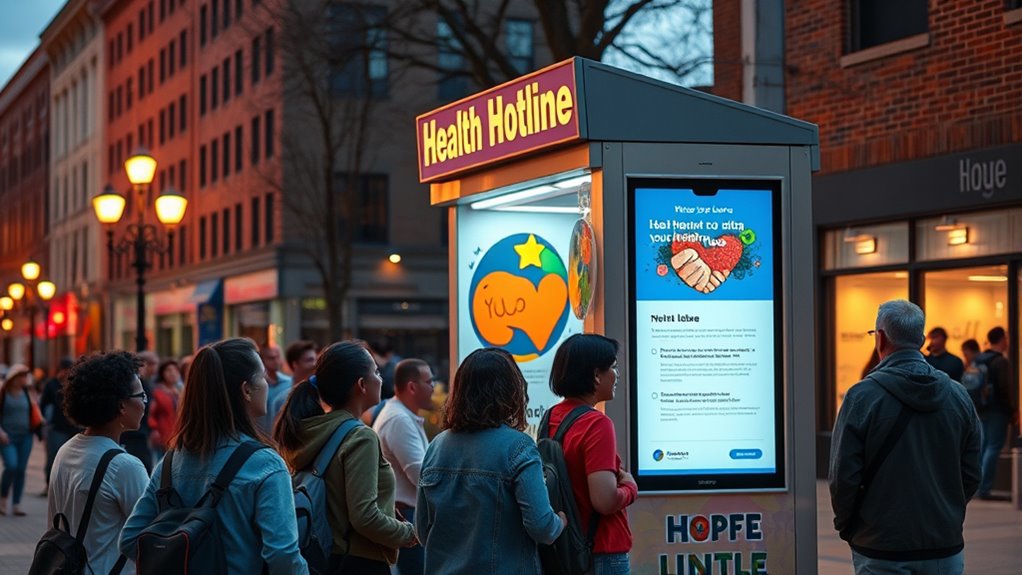If you’re looking for mental health hotlines tailored for ultra communities, you’ll find specialized support designed to address the unique emotional and physical challenges you face. These helplines focus on stigma reduction, peer mentorship, and culturally sensitive care, offering safe spaces for sharing fears, injuries, or feelings of isolation. They feature easy access across multiple channels and trained counselors familiar with your community’s dynamics. Keep exploring to discover how these resources can support your well-being and resilience.
Key Takeaways
- Specialized hotlines tailored for ultra communities focus on stigma reduction, peer support, and culturally sensitive counseling.
- Trained crisis intervention teams within these hotlines understand community-specific challenges and activity-related stressors.
- Hotlines offer multiple contact channels, ensuring confidentiality and accessibility for members experiencing burnout or isolation.
- They provide resources on mental health, legal issues, and community-specific support, fostering resilience and emotional well-being.
- Community-led peer support lines promote trust, normalize help-seeking, and encourage ongoing mental health conversations.
Understanding the Unique Mental Health Needs of Ultra Enthusiasts
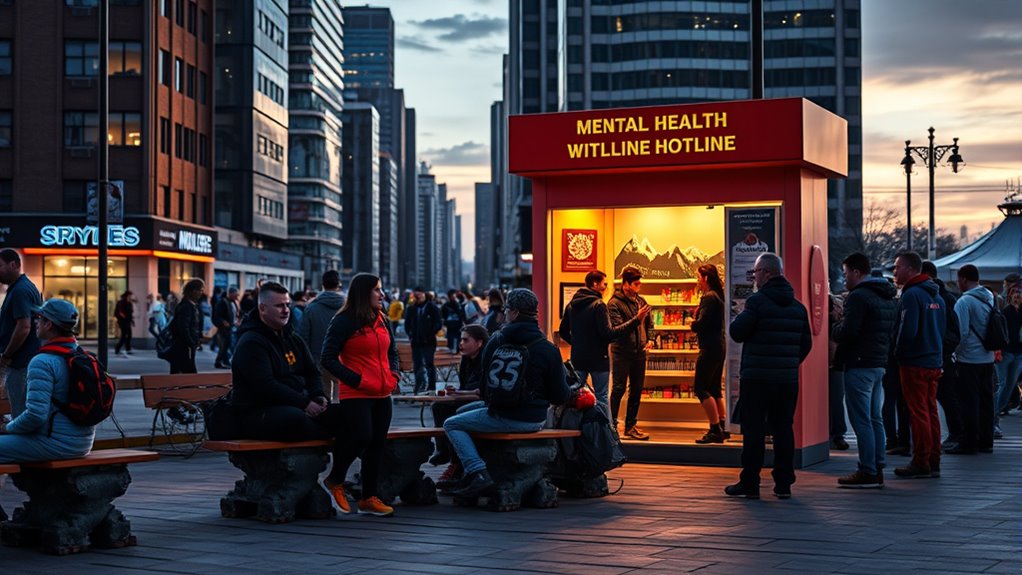
Understanding the unique mental health needs of ultra enthusiasts is essential because their intense passions often come with significant emotional and physical demands. These individuals push their limits, which can lead to stress, burnout, or feelings of isolation. Incorporating mindfulness techniques into your daily routine helps you stay grounded, reduce anxiety, and maintain focus amid high-pressure situations. Self care routines are equally crucial; they ensure you prioritize rest, nutrition, and recovery, preventing exhaustion. Recognizing these needs allows you to develop healthier habits that support mental resilience. Being aware of projector technology and its impact on visual comfort can also help reduce eye strain and associated stress during long viewing sessions. By actively managing stress through mindfulness and self care, you can sustain your passion without compromising your well-being. Staying mindful of these strategies empowers you to enjoy your pursuits while maintaining mental balance.
The Importance of Specialized Support for Niche Communities
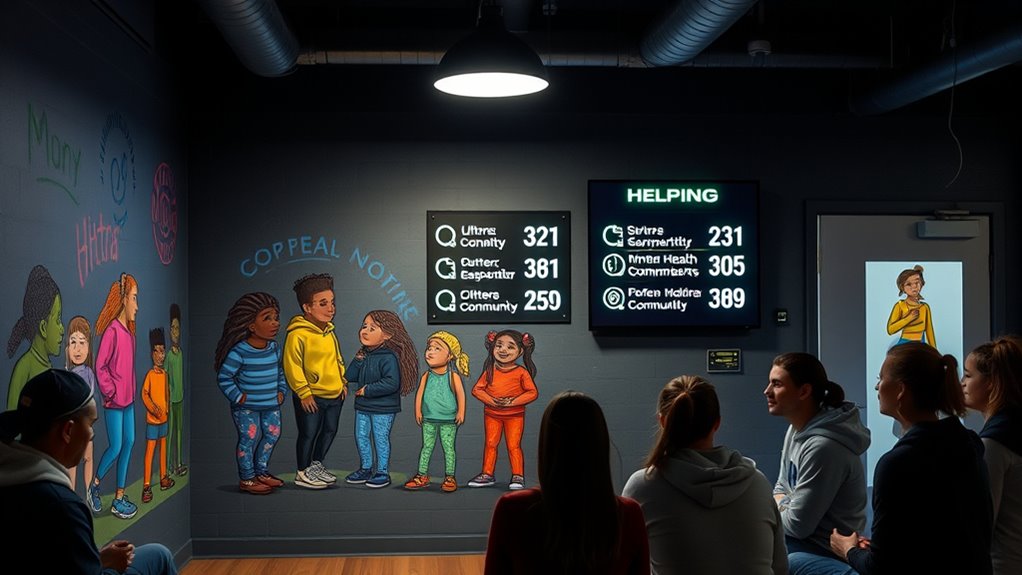
Specialized support is essential for niche communities because their unique experiences and challenges often require tailored approaches that general resources can’t provide. Standard counseling might not address the specific pressures or social dynamics you face. When someone from your community seeks help, crisis intervention teams trained in your community’s context can offer more relevant support. These services understand the cultural or activity-specific issues you encounter, making interventions more effective. Generic counseling often falls short because it lacks the nuanced understanding needed for your experiences. By providing targeted crisis intervention and specialized counseling, hotlines can better meet your needs, helping you navigate complex emotions and situations that are unique to your community. This focused approach ensures you get the right help when you need it most.
How Tailored Helplines Address Specific Challenges Faced by Extreme Sports Fans
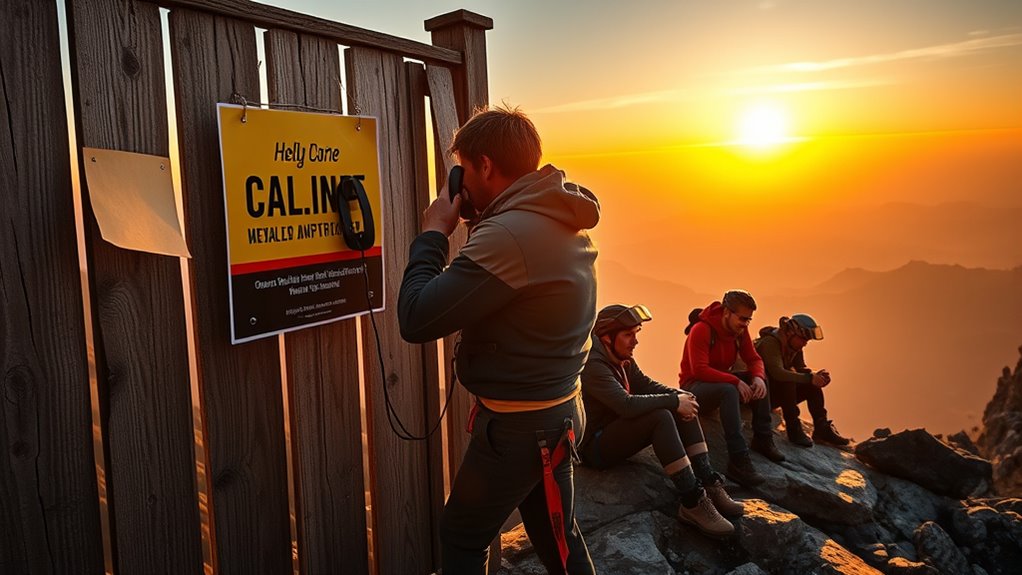
Extreme sports fans often face unique mental health challenges that general helplines may not fully address. Tailored helplines focus on these specific issues by offering stigma reduction and peer mentorship, helping you feel understood and supported. They create safe spaces where you can openly discuss risks like injury fears or feeling isolated after a crash. These helplines connect you with others who share your passion, fostering peer mentorship that boosts resilience. Understanding crisis intervention techniques can enhance the support provided during difficult moments.
Key Features of Effective Mental Health Hotlines for Ultra Groups
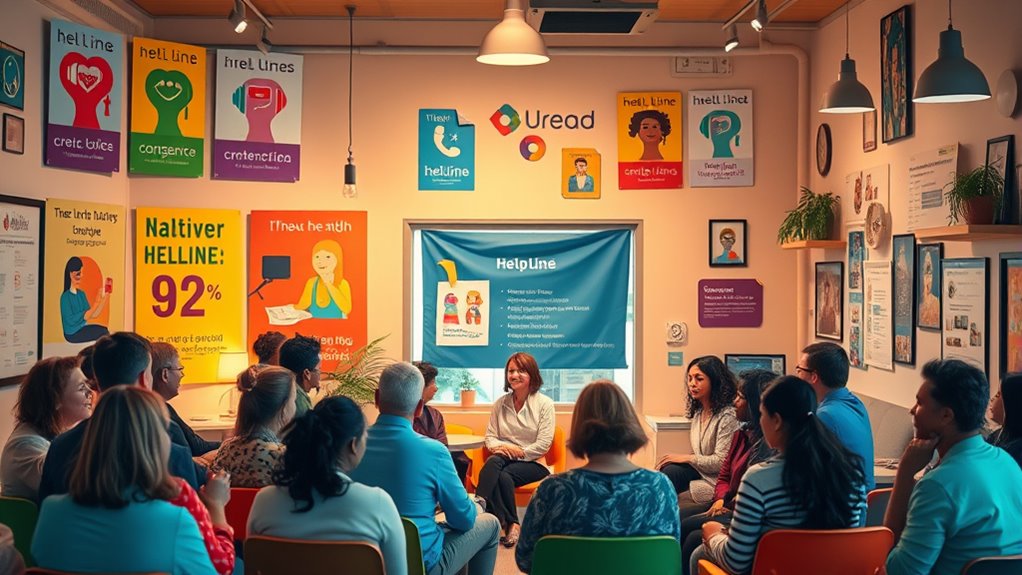
Effective mental health hotlines for ultra groups prioritize accessibility, confidentiality, and immediate support, guaranteeing you can reach out quickly during critical moments. They promote general awareness about mental health challenges faced by ultra community members and encourage open dialogue. Peer counseling is a key feature, allowing you to connect with someone who understands your experiences firsthand. To be truly effective, hotlines should offer:
- Easy-to-find contact options across multiple channels
- Confidentiality to build trust and safety
- Trained counselors familiar with ultra community issues
- Resources to boost general awareness and peer support
- Louisiana Alimony Laws knowledge to tailor support approaches to specific community needs
These features ensure you feel supported and understood, helping you navigate mental health challenges within your ultra group confidently.
Examples of Organizations Offering Dedicated Support for Niche Communities
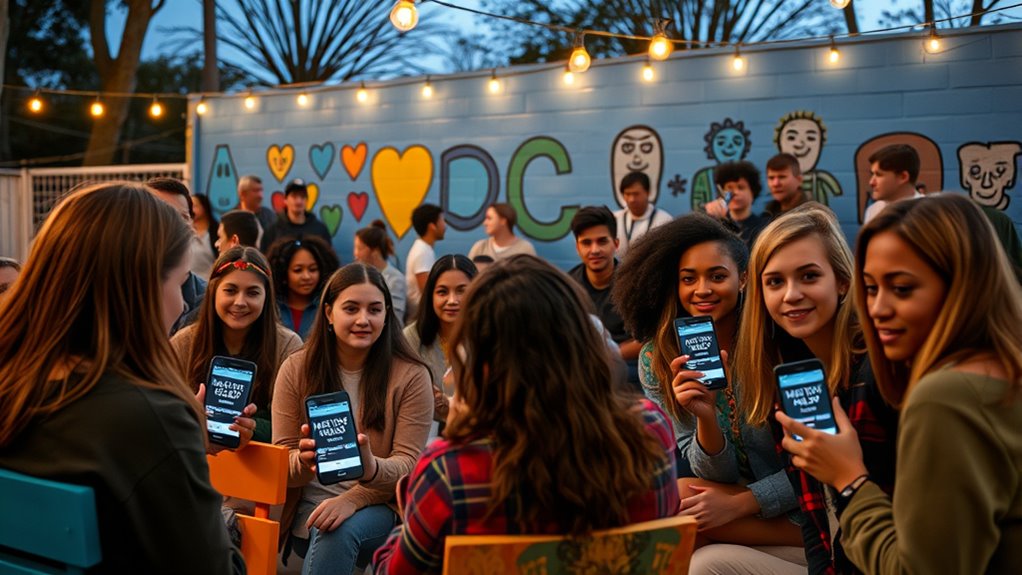
Many organizations provide specialized support to meet the unique needs of niche communities. These include crisis helplines tailored for specific groups like LGBTQ+ individuals or racial and ethnic minorities. Exploring these resources can help you find targeted assistance when you need it most. For example, some hotlines focus on mental health support within specific community settings, ensuring culturally sensitive and relevant care.
Specialized Crisis Helplines
Specialized crisis helplines play a essential role in providing targeted support for specific communities facing unique mental health challenges. These helplines connect you with trained professionals who understand your community’s experiences, offering peer mentorship and crisis prevention strategies. They often focus on building trust and fostering a sense of belonging, which can be pivotal during difficult times. Whether you’re seeking immediate help or long-term support, these services are tailored to meet your needs. They create safe spaces for open conversations, helping you navigate complex feelings and reduce feelings of isolation. By addressing community-specific issues directly, specialized helplines empower you to take proactive steps toward mental wellness and resilience.
- Connect with peers who truly understand your experiences
- Access crisis prevention resources tailored to your community
- Receive mentorship from those with shared backgrounds
- Get immediate support during emergencies or emotional lows
LGBTQ+ Support Services
LGBTQ+ support services are essential resources that connect you with organizations dedicated to addressing the unique mental health challenges faced by this community. These services focus on increasing mental health awareness and providing a safe space for you to share experiences. Many organizations offer peer support groups, where you can connect with others who understand your struggles firsthand. This peer interaction helps reduce feelings of isolation and fosters a sense of belonging. Additionally, these services often include counseling, crisis lines, and educational programs tailored specifically for LGBTQ+ individuals. By accessing these resources, you gain tools to navigate mental health issues while feeling supported and understood. Support services like these play a pivotal role in promoting mental well-being within the LGBTQ+ community. Vetted mental health resources ensure that the information and support provided are reliable and trustworthy.
Racial and Ethnic Resources
Racial and ethnic communities often face unique mental health challenges that require dedicated support. Many organizations recognize this need by offering culturally competent services tailored to specific backgrounds. These resources help navigate language barriers and guarantee you feel understood and respected.
Some examples include:
- Multilingual hotlines that provide services in your native language
- Organizations trained in cultural competence to address specific community concerns
- Support groups led by members of your racial or ethnic community
- Culturally sensitive mental health apps designed for diverse populations
- Culturally competent services that ensure mental health support is respectful and relevant to your cultural background
These resources aim to break down barriers and create safe spaces where you can access mental health support that truly resonates with your identity and experiences.
Strategies for Promoting Mental Health Resources Within Ultra Circles

Promoting mental health resources within ultra circles requires a strategic approach that leverages existing trust and communication channels. You should encourage peer support, where members feel comfortable sharing their experiences and offering help. This fosters a sense of community and normalizes mental health conversations. Additionally, focus on stigma reduction by openly addressing misconceptions and emphasizing that seeking help is a sign of strength, not weakness. Use trusted members to model positive attitudes toward mental health care, making it easier for others to follow suit. Share information through channels members already use, such as social media or group chats, to maximize reach and engagement. Recognizing the importance of energetic alignment can help foster a supportive environment—positive energy plays a crucial role in encouraging open dialogue about mental health. By building a supportive environment, you help break down barriers to accessing essential mental health resources within ultra circles.
Success Stories From Members Who Accessed Community-Specific Helplines
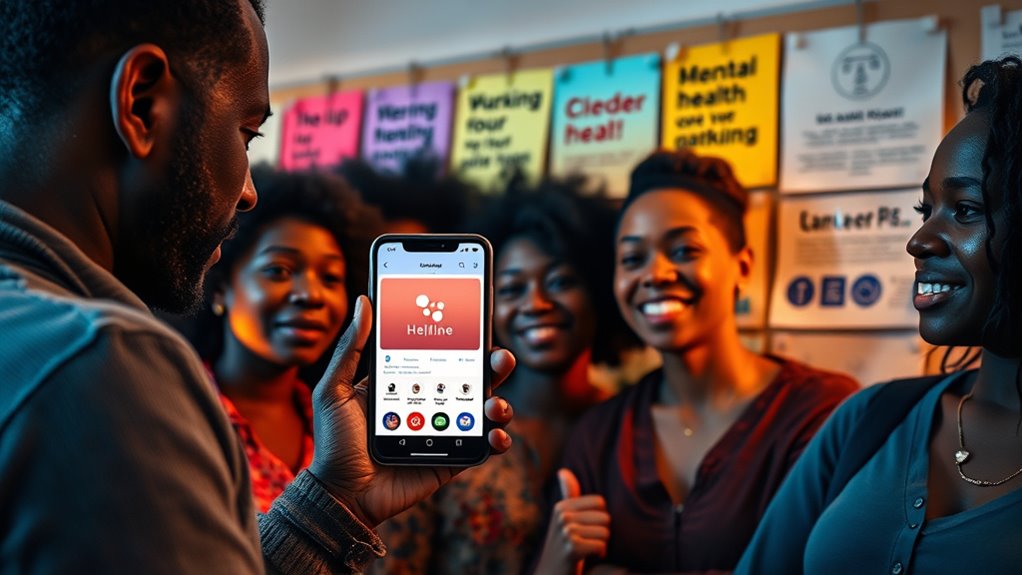
Many members find that reaching out to community-specific helplines helps break down stigma and opens the door to personal growth. These success stories show how support can lead to stronger resilience within your community. Sharing these journeys can inspire you to take the first step toward your own mental health improvement. Engaging in supportive environments can also enhance overall well-being and foster healing.
Overcoming Stigma Through Support
Accessing community-specific helplines can be a powerful step toward overcoming stigma surrounding mental health. When you reach out, you often discover others who understand your struggles, showing that you’re not alone. Many members find peer support helps break down barriers, making it easier to share your feelings. Hearing success stories from those who’ve used mindfulness techniques alongside community support inspires confidence in your journey. These stories remind you that seeking help is a sign of strength, not weakness. Connecting with people who understand your culture and experiences fosters trust and encourages openness. Ultimately, support from your community can transform shame into empowerment, helping you see mental health care as a positive, accessible resource. Incorporating wall organization systems can also create a supportive environment that promotes openness and order.
Personal Growth Journeys
Hearing success stories from others who’ve used community-specific helplines can inspire your own journey of personal growth. Many members have shared how practicing mindfulness techniques helped them stay grounded during tough times, leading to better emotional regulation. One individual found that daily mindfulness exercises reduced anxiety and increased self-awareness, allowing them to face challenges with resilience. Others describe how accessing specialized helplines provided immediate support, giving them tools to manage emotions more effectively. These stories highlight that small steps—like deep breathing or mindful reflection—can lead to meaningful change. By learning from others’ experiences, you can discover strategies tailored to your needs, empowering you to foster personal growth and build emotional strength within your community. Additionally, understanding the impact of personal finance strategies can help you secure a more stable future as you work through emotional challenges.
Building Community Resilience
Building community resilience often begins with the inspiring stories of members who have turned to local helplines during difficult times. These stories highlight how mental health awareness and peer support create strong, supportive networks. When you reach out, you discover you’re not alone, and others are facing similar challenges. Sharing your experience can encourage others to seek help, strengthening the community’s collective resilience. Many members have found renewed hope and stability through community-specific helplines, turning personal struggles into collective growth. Their stories serve as powerful reminders of the impact of accessible mental health resources. By fostering open conversations, these successes help reduce stigma and promote a culture of support that benefits everyone. Together, you can build a stronger, more resilient community.
Future Directions for Mental Health Support in Extreme and Niche Communities
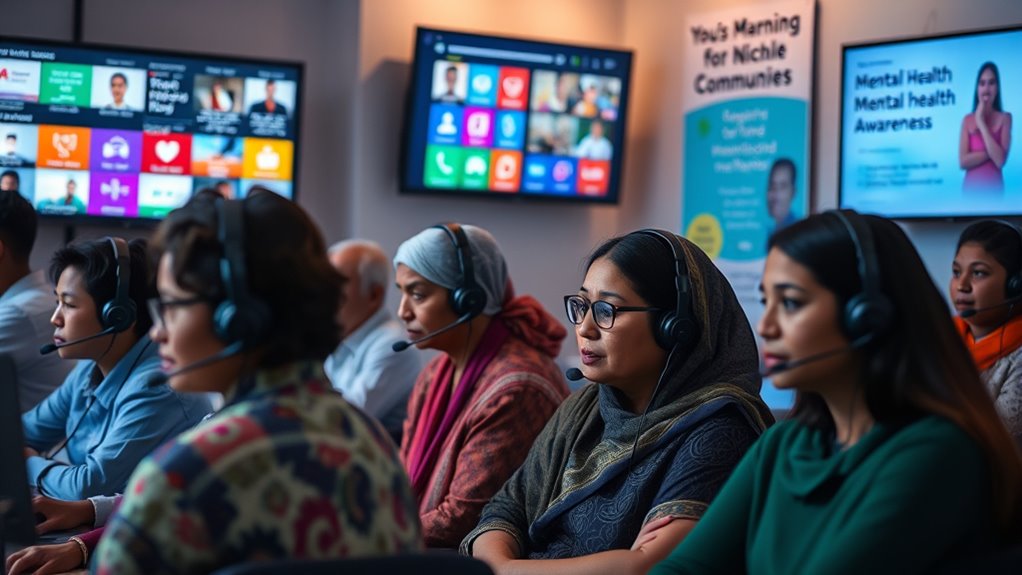
As mental health support evolves, addressing the unique needs of extreme and niche communities becomes increasingly crucial. Future strategies should integrate tailored approaches like mindfulness practices and peer support networks. These communities often face distinct challenges, requiring innovative solutions that foster trust and understanding. Technology can play a essential role by offering specialized platforms for anonymous sharing and guided mindfulness sessions. Collaborations with community members ensure interventions are relevant and effective. To illustrate potential future initiatives:
| Approach | Focus | Benefit |
|---|---|---|
| Digital Resources | Online mindfulness programs | Accessibility and flexibility |
| Peer Support Groups | Community-led counseling | Empowers members, reduces stigma |
| Customized Helplines | Niche-specific mental health hotlines | Immediate, relevant assistance |
| Training Initiatives | Educate community leaders | Sustainable mental health support |
| Data Analytics | Track trends and needs | Improve targeted interventions |
Frequently Asked Questions
How Do Ultra Community Hotlines Ensure Confidentiality and Privacy?
You might wonder how hotlines protect your privacy. They follow strict confidentiality protocols, ensuring your information stays secure and private. Trained staff are committed to confidentiality and only share details when legally required. Privacy policies guide their practices, outlining how your data is handled and protected. By adhering to these protocols and policies, hotlines create a safe space where you can openly discuss your concerns without fear of exposure.
What Qualifications Do Helpline Staff Have for Supporting Ultra Community Members?
Think of helpline staff as the backbone supporting your journey. They meet rigorous training requirements and adhere to certification standards, ensuring they’re well-equipped to support ultra community members. Their qualifications include mental health training, crisis intervention skills, and cultural competency. This solid foundation helps them listen effectively, provide guidance, and foster trust, so you feel safe sharing your concerns, knowing you’re supported by trained professionals committed to your well-being.
Are There Multilingual Mental Health Resources Available for Diverse Ultra Groups?
You’ll find that many mental health resources now prioritize multilingual support and cultural competence, ensuring diverse ultra community members get the help they need. These services often include interpreters, translated materials, and culturally sensitive training for staff. By offering multilingual support, providers make mental health care more accessible and respectful of different backgrounds, helping you feel understood and supported, no matter your language or cultural background.
How Accessible Are These Hotlines During Extreme Sports or Event Times?
Imagine you’re pushing your limits during an intense event, adrenaline surging, when suddenly, help is just a call away. These hotlines are often integrated with emergency preparedness plans, but accessibility varies during extreme sports or events. Community outreach programs aim to guarantee support remains available, yet high activity times may cause delays. Stay aware, stay connected—your mental health support is essential, even amid the thrill.
What Funding Sources Support the Sustainability of Ultra Community Mental Health Hotlines?
You might wonder how these hotlines stay funded long-term. Funding challenges often threaten their sustainability, but strong community partnerships can make a big difference. Local government grants, private donations, and sponsorships from organizations dedicated to mental health support are key sources. By collaborating with community groups and raising awareness, these hotlines can secure ongoing funding, ensuring they remain accessible and effective during even the most extreme sports or event times.
Conclusion
By bridging barriers and building bonds, tailored mental health hotlines transform trauma into trust within ultra communities. When you recognize the unique needs of extreme sports enthusiasts and niche groups, you empower individuals to embrace encouragement and encounter empathy. Supporting these specialized circles fosters freedom from fear and fuels future resilience. Remember, with dedicated dialogue and dynamic designs, you can deliver decisive help, keeping your community courageous, connected, and confident.
